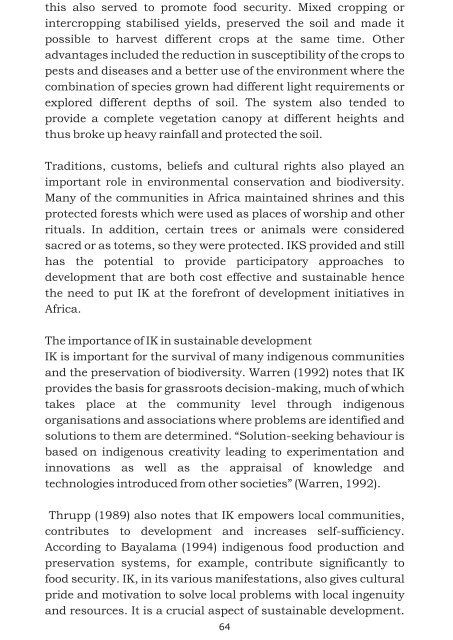Beneficiaries are actors too.pdf - Southern Institute of Peace ...
Beneficiaries are actors too.pdf - Southern Institute of Peace ...
Beneficiaries are actors too.pdf - Southern Institute of Peace ...
You also want an ePaper? Increase the reach of your titles
YUMPU automatically turns print PDFs into web optimized ePapers that Google loves.
this also served to promote food security. Mixed cropping or<br />
intercropping stabilised yields, preserved the soil and made it<br />
possible to harvest different crops at the same time. Other<br />
advantages included the reduction in susceptibility <strong>of</strong> the crops to<br />
pests and diseases and a better use <strong>of</strong> the environment where the<br />
combination <strong>of</strong> species grown had different light requirements or<br />
explored different depths <strong>of</strong> soil. The system also tended to<br />
provide a complete vegetation canopy at different heights and<br />
thus broke up heavy rainfall and protected the soil.<br />
Traditions, customs, beliefs and cultural rights also played an<br />
important role in environmental conservation and biodiversity.<br />
Many <strong>of</strong> the communities in Africa maintained shrines and this<br />
protected forests which were used as places <strong>of</strong> worship and other<br />
rituals. In addition, certain trees or animals were considered<br />
sacred or as totems, so they were protected. IKS provided and still<br />
has the potential to provide participatory approaches to<br />
development that <strong>are</strong> both cost effective and sustainable hence<br />
the need to put IK at the forefront <strong>of</strong> development initiatives in<br />
Africa.<br />
The importance <strong>of</strong> IK in sustainable development<br />
IK is important for the survival <strong>of</strong> many indigenous communities<br />
and the preservation <strong>of</strong> biodiversity. Warren (1992) notes that IK<br />
provides the basis for grassroots decision-making, much <strong>of</strong> which<br />
takes place at the community level through indigenous<br />
organisations and associations where problems <strong>are</strong> identified and<br />
solutions to them <strong>are</strong> determined. “Solution-seeking behaviour is<br />
based on indigenous creativity leading to experimentation and<br />
innovations as well as the appraisal <strong>of</strong> knowledge and<br />
technologies introduced from other societies” (Warren, 1992).<br />
Thrupp (1989) also notes that IK empowers local communities,<br />
contributes to development and increases self-sufficiency.<br />
According to Bayalama (1994) indigenous food production and<br />
preservation systems, for example, contribute significantly to<br />
food security. IK, in its various manifestations, also gives cultural<br />
pride and motivation to solve local problems with local ingenuity<br />
and resources. It is a crucial aspect <strong>of</strong> sustainable development.<br />
64


